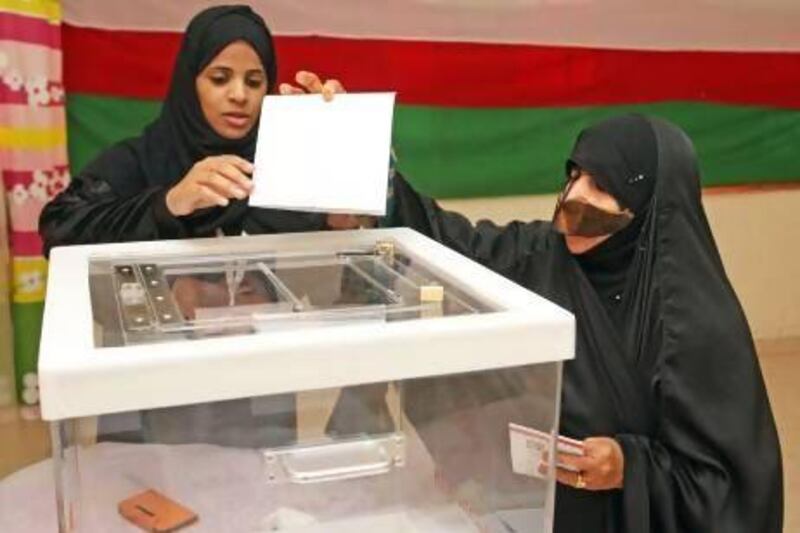MUSCAT // Omanis voted for their first municipal councils yesterday but some female candidates decided to stay on the sidelines, saying their aspirations are not being taken seriously.
About half of the women who signed up to as candidates in Oman's first local elections withdrew, said observers with the election commission. A total of 1,475 candidates were contesting the 192 seats. Initially, 46 were women.
"I took my name out of the candidate list a week before the election because I am not convinced that women are taken seriously in elections. The Shura Council, with all of its 20 years of existence, is a proof of that," 36-year old banker Khadija Suleiman, in Muscat.
Oman's only other elections are for the national Shura Council, a body that has some limited legislative powers. The last time a woman won a Shura seat was in 2004.
Increased democracy was a main demand of protesters in Omani cities during the Arab uprisings last year, along with jobs and an end to corruption. After the demonstrations, Sultan Qaboos bin Said Al Said swiftly reshuffled his cabinet and the government promised to create thousands of jobs, announced plans for municipal polls and granted the Shura Council some legislative power, with the right to approve or reject draft laws. The sultan, however, retains the final say.
Although municipal councils have only limited powers, some voters expressed hope they might spur job growth via their influence over local businesses. "I am here on the guarantee that the person I am voting for will work hard to find us jobs," said Badr Saif, a 24-year old school dropout from Barka, waiting at the polls. A statement from the election commission issued last week was seeking to reach all voters across the country of 2.8 million to vote fairly, with street slogans that say, "all voters are advised to vote for the right candidates, regardless of gender".
"No matter how many times men are told to elect women, it will not change anything. Men tell their wives and daughters not to vote for women. It is very sad that women follow what their men say," said Shamsa Al Harthy, 42, who also took her name off the ballot.
Voters, mostly men, turned up in steady numbers at the polling stations.
"About 70 per cent of the voters who turned up at all polling stations were men. Most women, it seems, stayed at home," Hamed Harith, a member of the election commission, told The National.
Women who came out to cast their ballots were not surprised and said that male chauvinism play a big part.
"I am not surprised that they are few women here. Yes, my husband asked me to vote for our neighbour and I am going to do just that," said Halima Al Esry, a mother of four, voting at the northern coastal town of Barka.
But some women say that men's prejudice lies in the core of the government hierarchy. They cited the example of only two women who are currently serving as cabinet ministers.
"The government decision makers must take women seriously by appointing more women in the cabinet. If they do that, then perhaps the voters will take up that example," said Nayla Khamis, 29, a voter at a Muscat polling station.
But some women say that it is not entirely due to male bias that prevent female from being elected.
"Women do not vote for other women and that is where the problem is. Why should we blame men if we don't take ourselves seriously?" asked Fairuz Al Harthy, 26, who said she was voting for a woman yesterday.
Oman says it created 52,000 public sector jobs in the first 10 months of this year, and at least 22,000 in the private sector, cutting the number of registered unemployed by three-quarters to just over 17,000.
foreign.desk@thenational.ae
* With additional reports from Reuters





